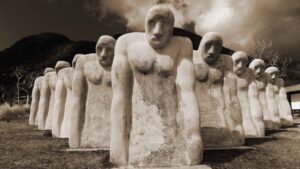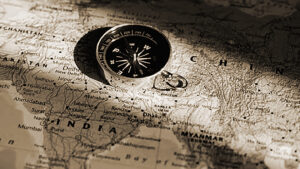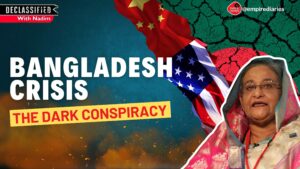Bhopal gas leak: Some disturbing links
December 4, 2023: Henry Kissinger. Rajiv Gandhi. JRD Tata. Eveready batteries – what is the link between these four things? The answer is: 1984 Bhopal gas disaster. This week marks 39 years of the gigantic corporate crime that jolted the nation in the uneasy winter of 1984.
This special report is not a usual flashback to the gas tragedy that claimed over 30,000 lives. It goes far deeper. It’s about the disturbing and perplexing role in this whole episode of American warmonger Kissinger, former Indian PM Rajiv Gandhi, celebrated industrialist JRD Tata, and the firm that makes Eveready batteries.
Let’s try putting the pieces of the puzzle together. It will help you understand why all the high-profile culprits got away scot-free; why 30,000 lives have been lost and yet no-one went to the gallows.
First, let’s do a quick recap of the events of the Bhopal gas tragedy. Late on December 2, 1984, shortly after midnight, there was a major malfunction in a chemical tank at a poorly managed pesticide plant. The factory was located in a densely populated part of Bhopal, with most of the inhabitants hailing from poor communities.
The malfunction at the plant cased a highly poisonous gas called methyl isocyanate (MIC) to gush out into the air, uncontrolled, for about two hours. The dangerous gas was a concoction of MIC, chloroform, and other chemicals – all of which are extremely toxic for humans if inhaled in generous doses. It fanned out of the factory, and quickly spread out in a 7km radius, engulfing the population surrounding the factory site.
Overnight, 3,000 to 4,000 people choked to death on spot or while trying to escape after inhaling the poisonous gas. Within three days, almost 7,000 bodies were seen lying around in the affected 7km radius. Thirty-nine years later, some estimates are now saying that the death toll from the 1984 Bhopal gas disaster could be as high as 30,000. It includes deaths from the immediate impact and delayed effects of the toxic gas.
Also, a few lakh people are known to be suffering from various complications following exposure to the gas on the night of the Bhopal gas disaster, while the frequency of newborns with birth defects is abnormally high compared to national figures.
Who owned the mess?
So, who owned the poorly maintained pesticide plant in Bhopal? A company called Union Carbide India Limited (UCIL) used to run it on lease. UCIL was a subsidiary of its parent company, Union Carbide Corporation, or simply Union Carbide, which is a notorious US-headquartered chemical company. Why is it notorious? Much before the Bhopal gas disaster, Union Carbide already had a history of accidents, health hazards, and controversies.
So, at the time of the Bhopal gas leak episode, US-based Union Carbide had a 50.9% stake in UCIL, its Indian subsidiary. Union Carbide still freely operates from its head office in Texas. In 2001, 17 years after the Bhopal crisis, another major US chemical company, Dow Chemical, took over Union Carbide. So, Union Carbide in America is today a subsidiary of Dow Chemical.
Let’s now look at UCIL, Union Carbide’s Indian subsidiary at that time. UCIL alone used to physically operate the controversial pesticide factory in Bhopal. UCIL, however, was not a new company that Union Carbide created. It has a long history of its own. UCIL has been around since 1905 under various names. It was established as National Carbon, when it made batteries and various industrial products. Later, it was renamed Eveready Company. Further down the line, in 1951, US-based Union Carbide took over Eveready and turned it into a subsidiary. So, as a subsidiary, Eveready was renamed UCIL.
When Union Carbide walked away
In 1995, 11 years after the Bhopal gas disaster, US-based Union Carbide sold off its full 50.9% stake in UCIL to an Indian company, McLeod Russel – a long-established tea company that was part of the Williamson Magor Group of companies in Kolkata. So, McLeod Russel, after taking over UCIL, brought the old name and renamed it as Eveready Industries India Limited.
The Eveready batteries that you get in your neighbourhood shops are manufactured by Eveready Industries. Most people are unaware of the history that this Eveready is the same company that once upon a time operated the ill-fated pesticide factory in Bhopal. Eveready doesn’t operate the factory site anymore, though. Soon after the Bhopal gas disaster, the lease and licence were cancelled by the Madhya Pradesh state government.
In a nutshell, UCIL was in charge of the factory in 1984. It was owned by US-based Union Carbide. After the gas tragedy, UCIL no longer ran the plant. Later, Union Carbide sold off UCIL, after which, UCIL became Eveready. Also, Dow Chemical took over Union Carbide.
Bhopal gas disaster: The blame-game
This short history of what happened to which company is important to know because all the corporate powers that were once involved in the 1984 Bhopal gas disaster, directly or indirectly, are passing the buck right now. None of them wants to own up to the corporate crime. They have their own explanations to offer.
UCIL no longer exists under that name; it’s now Eveready. So, Eveready argues: Why are we being blamed after so many years? We are not UCIL anymore; we don’t control the factory site either; our lease and licence were cancelled long back; why don’t you catch US-based Union Carbide? They owned UCIL at that time.
Union Carbide says: we are not at fault; we were only the parent company of UCIL; it was UCIL that was physically running the factory when the disaster happened; why don’t you go catch them instead? Besides, we are now owned by Dow Chemical; so, talk to Dow Chemical about the Bhopal gas disaster.
Dow Chemical’s explanation is: why are we being targeted? We had no connection with Union Carbide and UCIL in 1984 when the tragedy took place; we purchased Union Carbide only in 2001, 17 years after the episode happened; so, why catch us? Go catch UCIL instead.
So, everybody is passing the parcel around and claiming innocence. The actions that were taken were way too light for a human-made disaster of this magnitude. Union Carbide got away with a wrap on the knuckles. It was made to pay just $470 million as compensation to the victims’ families and for medical facilities required for the treatment of survivors injured by the toxic gas. The figure far less than the $3.3 billion that the Indian government had originally demanded from UCIL and/or Union Carbide as compensation over the 1984 Bhopal disaster.
Even worse, eight ground-level UCIL employees were convicted for “negligence” of duty on the fateful night when they were at the factory site. But they were released on bail shortly after the compensation verdict was delivered.
Warren Anderson’s great escape
The biggest name that escaped punishment was Warren Anderson, CEO and chairman of US-based Union Carbide at that time. Four days after the Bhopal gas disaster, Anderson flew down to Madhya Pradesh from the US. He was immediately arrested and taken into custody on orders from the Madhya Pradesh government. But a few hours later, he was released on bail. The American corporate honcho, who should have been taken to task by Indian authorities until proven innocent, simply dashed off to the airport, boarded a plane, and fled from the country.
In the subsequent months and years, the Indian courts tried their best, but could never drag him back to Indian territory for a trial. It is well known since 1984 that PM Rajiv Gandhi had intervened to save Anderson following the Union Carbide CEO’s arrest in Madhya Pradesh. He ordered the Madhya Pradesh government under CM Arjun Singh to ensure Anderson was safely escorted out of the country.
The assumption since then is that the US government, which is a global bully dictated by the American corporate class, pulled the strings. Quite likely, it was Washington that ordered Rajiv Gandhi to arrange Anderson’s great escape from the jaws of justice.
It is an insult to this country that Anderson spent his final years in peace in the beautiful, elite town of Vero Beach in Florida. He died of old age at 92 in 2014 – almost 30 years after the Bhopal gas leak. The corporate criminal walked away without a scratch.
The Henry Kissinger – JRD Tata link
Talking about Rajiv Gandhi’s role in protecting the Union Carbide CEO, there’s another outrageous fact you should never forget. Not just Rajiv Gandhi alone, Indian corporate rockstar JRD Tata also acted as an agent for the US company over the Bhopal gas tragedy’s compensation case.
We now have evidence in the form of a letter that JRD Tata, former Tata group chairman, was lobbying on behalf of Union Carbide and Henry Kissinger. Now, why Kissinger? What did he have to do with the Bhopal gas disaster? Union Carbide had hired Kissinger’s consulting firm, Kissinger Associates, to handle the case.
So, former US secretary of state Kissinger’s company was helping Union Carbide handle the legal matters and negotiations related to the 1984 Bhopal gas episode. Kissinger recently died at 100. We all know who he was – the biggest warmongering US diplomat since World War 2. It’s only natural that someone with a dubious track record like Kissinger was hired by the tainted US company Union Carbide over the Bhopal case.
Let’s now come to a letter that JRD Tata had written to PM Rajiv Gandhi on behalf of Union Carbide and Kissinger in 1988. That letter came to light when the environment news monitor, Down To Earth, published it on December 2, 2014. (It can be seen here). JRD Tata sent it to Rajiv Gandhi from his Mumbai office on May 31, 1988. The letter was marked “strictly personal and confidential”. Clearly, JRD Tata was acting only in a personal capacity; the rest of the Tata family, then and now, have no official role in the matter.
In the letter, JRD Tata told Rajiv Gandhi to pay heed to Kissinger’s advice and accept an offer from Union Carbide for a proposed compensation payment. Tata told Rajiv Gandhi that Union Carbide was ready to pay a “generous” amount, but only as an out-of-court settlement. The letter doesn’t mention any figure.
JRD Tata wrote: “Dr. Henry Kissinger… a good friend of mine, is, as you may know, consultant and adviser to many governments and large corporations, including Union Carbide in America. He told me of their and his own concern at the long delay in reaching agreement on the amount of the compensation to be paid to the victims of the Bhopal disaster.”
After pitching Kissinger’s compensation proposal, JRD Tata wrote at the end of the letter, “I told Dr. Kissinger that I would, confidentially, convey his views to you.”
Who’s working for whom, really?
After the Bhopal gas leak crisis, the entire country should have come together and gone after Union Carbide, the parent company legally responsible for the corporate crime, isn’t it? Instead, we had a top Indian industrialist lobbying on behalf of Kissinger and his client, Union Carbide. What should ideally have been the Indian PM’s reaction to this letter? To either inform the press about it, or at least, ignore to it completely.
Instead, what did Rajiv Gandhi do? Two weeks after receiving JRD Tata’s letter, the Indian PM wrote back to him on June 14, 1988, meekly saying: “The suggestions will be given consideration.” (It can be seen here). Next year, in February 1989, the Supreme Court ordered a settlement. Criminal and civil proceedings against UCIL were dropped, and it was told to pay a full and final compensation of $470 million. It was far less than the original claim of $3.3 billion made by the Indian government. Don’t forget here that the same Rajiv Gandhi had also allowed Warren Anderson to cut loose and escape punishment.
So, No.1, all the corporate players involved in the Bhopal gas disaster are busy passing the buck – Union Carbide, Dow Chemical, and Eveready Industries. UCIL got away with a low compensation for such a gigantic crime. Low-level local convicts were released. And high-profile foreign culprits were allowed to walk free. No.2, we saw the country’s leading industrialist lobbying with the PM on behalf of the errant foreign company – and the PM played along.
Now, in all these aspects about the Bhopal gas disaster, the larger picture is getting lost. It is the dark role of pesticides in the lives of Indians. Ever since the country’s farming sector was disrupted under the deceptive name of ‘Green Revolution’, pesticides became a liability in the country in the long run.
Bhopal gas disaster: The pesticide story
Foreign pesticide companies now have a firm grip on Indian agriculture. Companies such as Bayer, Syngenta, and BASF produce and sell plenty of pesticides here. As Indian farmers have moved from natural farming to chemical farming, rural miseries have shot up. Pesticides and fertilisers have pushed up the cost and complexity of farming. As a result of farming becoming increasingly expensive, we continuously have farmer suicides because they are unable to repay loans.
Also, pesticides are suspected to be one of the main causes of a cancer outbreak across Bharat. Many of you have heard about the ‘cancer train’ in Punjab. It’s a train service that runs every day from Punjab’s Bathinda to Bikaner in Rajasthan. About 60% of the train’s passengers, any given night, are cancer patients going for treatment. Excess pesticide-use is seen by many as the leading cause of an explosion of cancer across Punjab.
So, when the pesticide factory in Bhopal leaked toxic gas and killed thousands of people, it was time to draw the line. The country should have banned the use of pesticides after the Bhopal gas disaster. Bharat was already hit by enough miseries caused directly and indirectly by pesticides, but no-one was noticing. The Bhopal gas leak served as a wake-up call. But nobody cared.
How many more deaths need to happen before we Indians decide to take a stand? A stand against foreign companies playing toxic games on our soil at the cost of human lives. How many more Bhopals should happen? How many more cancer trains should be rolled out?
When you will sit tight with popcorn to watch a newly released web series on the Bhopal gas disaster, don’t treat it as mere entertainment. Watch it, and think about the deeper stories and the untold truths.
COPYRIGHT & REPUBLISHING TERMS:
All rights to this content are reserved with Empire Diaries. If you want to republish this content in any form, in part or in full, please contact us at writetoempirediaries@gmail.com.









Just wish to say your article is as surprising The clearness in your post is just cool and i could assume youre an expert on this subject Fine with your permission allow me to grab your RSS feed to keep updated with forthcoming post Thanks a million and please keep up the enjoyable work
Hi, Neat post. There’s an issue together with your web site in internet explorer, may test this·IE still is the marketplace chief and a good component of people will pass over your fantastic writing due to this problem.